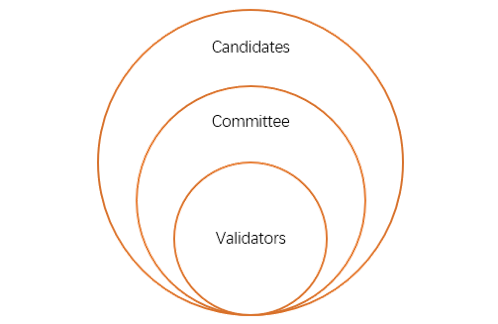Consensus Nodes Election
Neo is an open and transparent blockchain network where anyone can either initiate a transaction to apply for being a validator candidate or vote to decide which validator candidate can become a consensus node. The committee members and validators are elected based on the voting result.
note
Committee members have the privilege to modify the configuration of Neo network by voting, currently including fee per byte for network transmission, execution fee factor, storage price, blocking / unblocking account, etc.
There is no duty assigned to candidates. However, committee members and validators are elected from certain number of candidates with most votes. Their relationship can be described in the following picture. There is no explicit relationship between committee members and validators but, as default committee member amount (21) is more than that of validators, generally speaking validators are a subset of committee members.

Every address has the right to vote to only one address (whether or not it's a candidate). A candidate's received votes are defined as the sum of NEO held by its voter.
Voting is a dynamic and continuous process. If the NEO asset of a voter is changed, the number of votes at the previous voting address will also change, and the list of consensus nodes and committee members will change accordingly every 21 blocks.
note
Genesis Block is the first block,its NextConsensus is set to the script hash of standby consensus nodes' multi-signature contract.
From Delegate to Speaker#
A speaker is a consensus node who creates the next proposal block. The list of consensus nodes is obtained by the method above, and the speaker is determined by the formula p = (h - v) mod N in the dBFT algorithm. h is the height of the proposal block. v is view number, start from 0. N is the number of consensus nodes.
During the consensus phase, a speaker will send PrepareRequest message with NextConsensus, which determines the next block consensus nodes. The Speaker gets the next round of consensus nodes by combining the transactions in the proposal block with the previous votes in blockchain, and assign the script hash of 2/3 multi-signature contract to NextConsensus.